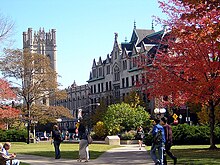Edward H. Levi
Edward Hirsch Levi (born June 26, 1911 in Chicago , Illinois ; † March 7, 2000 ibid) was an American lawyer, politician ( Republican Party ) and attorney general (Attorney General) .
Studies and professional career
Levi, whose father and grandfather were rabbis , first completed a general education course at the University of Chicago , which he completed in 1932 with a Bachelor of Arts (AB) . He then studied law at the Law School of the University of Chicago, where he graduated in 1935 as a Juris Doctor (JD). In the following year he was not only admitted to the bar in Illinois , but also as an assistant professor of law . In 1938 he earned a Doctor of Laws (JSD) from Yale University .
After the war he returned to the University of Chicago as a professor and was appointed Dean of the Law School in 1950. In 1962 he resigned as dean to take up the post of provost at the University of Chicago. Also in 1962 he was elected to the American Academy of Arts and Sciences . In 1986 he became its president. Since 1978 he was a member of the American Philosophical Society .
From November 14, 1968 to January 14, 1975, he was the successor of the biologist and 1958 Nobel Prize in Medicine , George Wells Beadle , President of the University of Chicago. During his tenure, there were student riots and the university building was occupied by students.
After his tenure as attorney general, he returned to the University of Chicago as a professor of law and was also a member of its Board of Trustees . He was also a visiting professor at Stanford University's Law School from 1977 to 1978 . Later, he was also a member of the Board of the John D. and Catherine T. MacArthur Foundation , which since 1981 Valued at $ 500,000 scholarships (MacArthur Fellowship) awards for creative minds and scholars in the US. In 1985 he retired and became Professor Emeritus .
His son David , who was presiding judge of the US District Court of Eastern California until June 2007 , became Dean of the Law School of Duke University in Durham in July 2007 .
Political career
Government advisor
In addition to his career as a professor, he repeatedly performed advisory activities for the government. During the Second World War he was from 1940 to 1945 special assistant to Justice Secretary Robert H. Jackson and Francis Biddle in the Department of Competition Law ( Antitrust Division ). During this time he was also chairman of the Interministerial Committee on Monopolies and Cartels in 1944 .
In 1950 he was chief adviser on the Monopoly Subcommittee of the Justice Committee of the US House of Representatives .
During the tenure of President Lyndon B. Johnson he was a member of the White House Central Working Group on Domestic Policy in 1964 and then from 1966 to 1967 of the Special Working Group on Education . President Richard Nixon called him to the Special Working Group on Higher Education between 1969 and 1970.
Justice Minister under President Ford
On January 14, 1975, President Gerald Ford appointed him to his cabinet as Attorney General . During his tenure in 1976, Levi issued a series of directives restricting the activities of the Federal Bureau of Investigation (FBI). These guides require clear evidence before the FBI was allowed to use intelligence-like methods such as telecommunications surveillance and entering homes without warning. However, these regulations were replaced seven years later by new instructions from Attorney General William French Smith . A major focus of his work as Minister of Justice was the reorganization of the Justice Department after the Watergate affair .
Finally, he convinced President Ford to appoint his Chicago university colleague John Paul Stevens as a judge at the Supreme Court of the United States .
Publications
- An Introduction to Legal Reasoning. 1949
- Point of View: Talks on Education . Collected Speeches, 1974
Web links and background literature
- [* Edward H. Levi in the Miller Center of Public Affairs of the University of Virginia (English) Caspar Weinberger] in the Miller Center of Public Affairs of the University of Virginia (English)
- Biography on the homepage of the Ministry of Justice
- Happy Marriage in Chicago. Article in TIME magazine on September 22, 1967
- Obituary on the homepage of the University of Chicago
Individual evidence
- ^ Member History: Edward H. Levi. American Philosophical Society, accessed December 14, 2018 .
| personal data | |
|---|---|
| SURNAME | Levi, Edward H. |
| ALTERNATIVE NAMES | Levi, Edward Hirsch (full name) |
| BRIEF DESCRIPTION | American Lawyer, Politician (Republican Party), and Attorney General |
| DATE OF BIRTH | June 26, 1911 |
| PLACE OF BIRTH | Chicago , Illinois |
| DATE OF DEATH | March 7, 2000 |
| Place of death | Chicago , Illinois |



